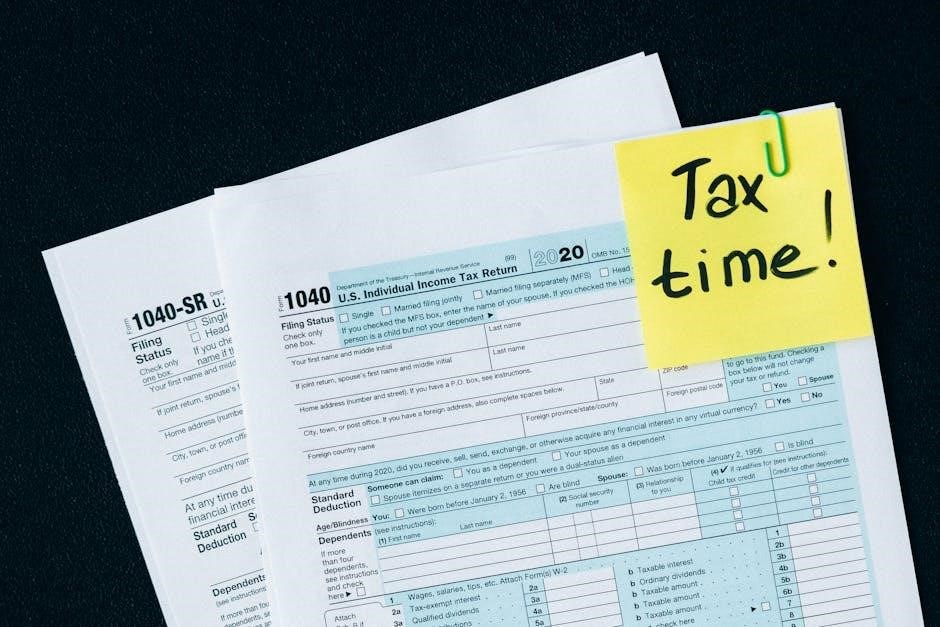The Children’s Services Award 2024 is a crucial document outlining pay rates, classifications, and entitlements for employees in the childcare sector, ensuring fair workplace conditions.
1.1 Overview of the Award
The Children’s Services Award 2024 governs employment conditions for workers in early childhood education and care. It outlines pay rates, classifications, allowances, and entitlements, ensuring compliance with Fair Work standards. The Award applies to employees in childcare centers, kindergartens, and other related services. It provides a structured framework for wages, penalty rates, and career progression. Recent updates from the Fair Work Commission aim to enhance fairness and transparency. The Award also includes provisions for overtime, leave, and workplace rights, supporting both employers and employees in understanding their obligations and entitlements. This guide is essential for maintaining compliance and fostering equitable workplace practices.
1.2 Importance of the Pay Guide
The pay guide is essential for employers and employees to understand their obligations and entitlements under the Children’s Services Award 2024. It ensures compliance with Fair Work standards, providing clarity on pay rates, penalty rates, and allowances. The guide helps employers calculate accurate wages, preventing errors and disputes. Employees benefit from transparency regarding their earnings and conditions. Recent updates from the Fair Work Commission emphasize the need for precise payment methods. The guide is a vital resource for maintaining fairness and adherence to workplace laws, ensuring all parties are informed and protected under the Award. It is regularly updated to reflect industry changes and regulatory requirements.
Key Features of the Children’s Services Award
The Award includes updated pay classification structures, a 15% wage increase above modern rates, and additional funding for on-costs, ensuring fair and competitive compensation in the sector.
2.1 Pay Rates and Classifications
The Children’s Services Award 2024 outlines specific pay rates and classifications for employees, ensuring fair compensation based on roles and experience. Classifications range from entry-level to supervisory roles, with rates increasing according to skill levels and responsibilities. For instance, Level 2.1 starts at $24.84 per hour, progressing to $25.66 at Level 2.2 after one year. These rates are determined by the Fair Work Commission to reflect industry standards and ensure transparency in pay structures. Employers must adhere to these classifications to maintain compliance and provide accurate wages to employees. This system promotes equity and clarity in the workforce.
2.2 Allowances and Penalty Rates
The Children’s Services Award 2024 includes provisions for allowances and penalty rates to compensate employees for specific work conditions. Allowances may cover responsibilities like first aid or supervisory duties, while penalty rates apply for work outside standard hours, such as evenings, weekends, or public holidays. These additional payments ensure fair compensation for employees who work under less typical conditions. The Award specifies percentage increases for overtime and shift work, aligning with industry standards. Employers must accurately calculate and apply these rates to maintain compliance and ensure employees receive their full entitlements under the Fair Work Commission’s guidelines.

How to Calculate Pay Rates and Allowances
Use the Fair Work Commission’s Pay and Conditions Tool to accurately determine pay rates, allowances, and penalty rates for employees under the Children’s Services Award 2024.
3.1 Step-by-Step Guide to Calculating Pay
To calculate pay under the Children’s Services Award 2024, follow these steps:
- Determine the employee’s classification level based on their role and experience;
- Use the Fair Work Commission’s Pay and Conditions Tool to find the corresponding base pay rate.
- Apply any applicable penalty rates for overtime, weekends, or public holidays.
- Add allowances for specific duties, such as first aid or supervisory roles.
- Calculate the total pay by summing the base rate, penalties, and allowances.
- Keep accurate records for compliance and auditing purposes.
This method ensures transparency and accuracy in adhering to the Award’s requirements.
3.2 Understanding Penalty Rates and Overtime
Penalty rates and overtime pay are essential components of the Children’s Services Award 2024, ensuring fair compensation for work outside standard hours. Penalty rates apply to shifts on weekends, public holidays, or late evenings, typically ranging from 15% to 50% above base pay. Overtime rates, such as 1.5 times the base rate for work beyond 38 hours per week, are also included. These rates are calculated using the Fair Work Commission’s Pay and Conditions Tool, which provides accurate entitlements based on classification levels. Employers must ensure compliance with these provisions to avoid underpayment and maintain workplace fairness.
Recent Changes and Updates to the Award
The 2024 updates include a 15% wage increase above modern award rates and additional funding for on-costs, ensuring fair compensation and supporting service providers effectively.
4.1 2024 Updates from the Fair Work Commission
The Fair Work Commission introduced significant updates to the Children’s Services Award in 2024, focusing on enhanced pay rates and a revised classification structure. These changes aim to address wage discrepancies and improve workforce conditions. A 15% wage increase above modern award rates was implemented to ensure fair compensation for employees. Additionally, a new pay classification system was introduced, streamlining entitlements and progression pathways. These updates reflect the Commission’s commitment to equity and transparency in the childcare sector.
4.2 Impact of the New Pay Classification Structure
The new pay classification structure under the 2024 Children’s Services Award has streamlined entitlements and career progression for employees. It introduced clearer pay rates and levels, ensuring fair compensation based on roles and experience. For instance, supervisors and room leaders are now classified under Level 4, with specific wage increases. This change has enhanced transparency and equity in the sector, benefiting both employers and employees. However, it also brings challenges, such as adjusting to new classification requirements and potential increases in operational costs for service providers. Overall, the restructure aims to modernize the workforce framework.

Tools and Resources for Pay Guide Compliance
Key tools include the Fair Work Ombudsman’s Pay and Conditions Tool and online resources to help employers and employees understand pay rates, entitlements, and compliance requirements.
5.1 Using the Pay and Conditions Tool
The Fair Work Ombudsman’s Pay and Conditions Tool is an essential resource for calculating accurate pay rates, penalty rates, and allowances under the Children’s Services Award. This tool simplifies compliance by providing up-to-date information on minimum wages, overtime, and leave entitlements. Employers can input specific details about an employee’s role, hours, and experience to determine correct pay entitlements. Additionally, it offers guidance on notice periods and redundancy payments, ensuring transparency and fairness in workplace compensation. Regular updates reflect changes in the Award, making it a reliable resource for both employers and employees to navigate pay-related requirements effectively.
5.2 Fair Work Ombudsman Resources
The Fair Work Ombudsman provides comprehensive resources to help employers and employees understand and comply with the Children’s Services Award 2024. Key resources include the Pay Guide, which details pay rates, allowances, and penalty rates, and the Pay and Conditions Tool, an interactive calculator for determining accurate entitlements. Additionally, the Ombudsman offers fact sheets and webinars to clarify complex aspects of the Award. These resources ensure transparency and help users navigate the legal requirements of the childcare sector effectively. Regular updates are also provided to reflect changes in the Award, ensuring compliance and fairness in the workplace.

Understanding Pay Classifications and Levels
The Children’s Services Award 2024 categorizes roles into distinct levels, each with specific duties and pay rates, ensuring fair compensation based on experience and responsibilities.
6.1 Specific Classifications and Their Entitlements
The Children’s Services Award 2024 outlines specific classifications, such as Level 2.1 and Level 2.2, with corresponding pay rates and experience requirements. Level 2.1 applies to entry-level roles, while Level 2.2 is for employees with one year of experience. Supervisors or room leaders fall under Level 4, entitled to higher pay rates and additional allowances. Each classification ensures fair compensation based on responsibilities and experience, aligning with industry standards and regulatory requirements. Accurate classification is crucial for employers to meet their obligations and for employees to receive correct entitlements.
6.2 Progression Between Levels and Experience Requirements
Under the Children’s Services Award 2024, progression between levels is based on experience and qualifications. Moving from Level 2.1 to 2.2 requires at least one year of service. Supervisors at Level 4 need demonstrated leadership skills. Employers must document experience accurately to ensure correct pay rates. This structured progression ensures employees are fairly compensated for their growing expertise, maintaining transparency and equity in the workplace. Proper tracking of experience is essential for compliance with the Award’s requirements and employee entitlements.

Financial Implications for Service Providers
The 2024 Award introduces a 15% wage increase above modern rates and additional 20% funding for on-costs, impacting service providers’ budgets and financial planning significantly.
7.1 Wage Increase Above Modern Award Rates
The Children’s Services Award 2024 includes a 15% wage increase above modern award rates, reflecting the sector’s high demand and the need to retain skilled professionals. This adjustment ensures fair compensation, addressing cost-of-living pressures. Employers must implement these rates to maintain compliance, while service providers may face budget challenges. The increase applies uniformly across all classifications, ensuring equity. Proper financial planning is essential to absorb these costs without compromising service quality. This change underscores the government’s commitment to valuing early childhood educators’ contributions.
7.2 Funding for On-Costs and Eligibility Criteria
The 2024 Award includes a 20% additional funding for eligible on-costs, calculated against base funding, to support service providers. This funding aims to offset increased labor expenses, ensuring sustainability. Eligibility is tied to compliance with the 15% wage increase and accurate record-keeping. Providers must demonstrate adherence to Fair Work Commission requirements to access this funding; The initiative helps maintain service quality while addressing financial pressures. Proper documentation and audit preparedness are essential for eligibility. This funding reflects the government’s commitment to supporting the childcare sector amid rising costs.

Compliance and Record-Keeping Requirements
Employers must maintain accurate records, including payroll details and employee hours, to ensure compliance with the Award and prepare for audits. Compliance is crucial for avoiding penalties.
8.1 Maintaining Accurate Pay Records
Accurate pay records are essential for compliance with the Children’s Services Award 2024. Employers must document all payments, including base rates, allowances, and penalty rates. Records should detail each employee’s classification level, hours worked, and any overtime or leave taken. This ensures transparency and accountability, aiding in audits and disputes. Employers are advised to use the Fair Work Ombudsman’s Pay and Conditions Tool to verify calculations and maintain up-to-date records. Proper documentation protects both employers and employees, ensuring all entitlements are met and legal obligations are fulfilled.
8.2 Audits and Ensuring Compliance
Regular audits are vital to ensure compliance with the Children’s Services Award 2024. Employers must review pay records, classifications, and entitlements to confirm adherence to the award’s requirements. The Fair Work Ombudsman conducts audits to verify accurate payment of wages, allowances, and penalty rates. Non-compliance can result in penalties, emphasizing the importance of proactive checks. Employers should utilize the Pay and Conditions Tool to cross-verify calculations and maintain transparency; By ensuring compliance, employers protect their reputation and avoid legal issues, fostering a fair and trustworthy work environment for all employees in the childcare sector.
Implications for Employers and Employees
The Children’s Services Award 2024 impacts employers through compliance obligations and employees via enhanced entitlements, ensuring fair wages and updated workplace conditions across the sector.
9.1 Employer Obligations Under the Award
Employers must adhere to the Children’s Services Award 2024 by maintaining accurate pay records, ensuring compliance with pay rates, and providing entitlements like allowances and penalty rates. They are required to use tools like the Pay and Conditions Tool to calculate correct payments and stay updated on Fair Work Commission changes. Employers must also ensure funding for on-costs, as specified by the Award, and comply with new classification structures. Failure to meet these obligations can result in audits and penalties, emphasizing the importance of understanding and implementing the Award’s requirements effectively to avoid non-compliance risks.
9.2 Employee Entitlements and Rights
The Children’s Services Award 2024 ensures employees receive fair pay rates, allowances, and penalty rates based on their classifications. Employees are entitled to accurate payment calculations using tools like the Pay and Conditions Tool. They also have the right to minimum wage increases, as outlined in the Award, and additional funding for on-costs. Employees can access resources from the Fair Work Ombudsman to understand their entitlements and ensure compliance with the Award. These entitlements protect workers’ rights, providing clarity on classifications, progression levels, and fair workplace conditions under the Children’s Services Award 2024 framework.

Industry Reactions and Feedback
The 2024 Award has received positive feedback for its updated pay rates and additional funding for on-costs, benefiting early learning services and employees alike, fostering a fair workplace culture.
10.1 Response from Early Learning Services
Early learning services have expressed mixed reactions to the 2024 Children’s Services Award. Many appreciate the 15% wage increase and additional 20% funding for on-costs, which aim to enhance staff retention and service quality. However, some providers are concerned about the potential financial strain, particularly smaller centers. The new pay classification structure has been welcomed for its clarity, but there are worries about implementation complexities. Overall, the sector acknowledges the Fair Work Commission’s efforts to address pay equity but seeks further support to ensure sustainable service delivery without compromising quality care for children.
10.2 Impact on Workforce and Service Delivery
The 2024 Children’s Services Award has significant implications for the workforce and service delivery. The wage increase and revised classifications aim to improve employee retention and attract skilled professionals, addressing staffing shortages. Enhanced penalty rates and allowances may boost worker morale, particularly for those in supervisory roles. However, service providers are cautious about balancing increased labor costs with maintaining affordable childcare fees. The new structure may lead to operational adjustments, such as staff restructuring or budget reallocations, to comply with the updated pay guide and ensure continued quality care for children without overburdening families.

Frequently Asked Questions (FAQs)
Common queries include understanding pay rate calculations, entitlements under the new classification structure, and how to access the Pay and Conditions Tool for accurate entitlement checks.
11.1 Common Queries About Pay Rates
Employees often ask about pay rate calculations, especially for different classifications and experience levels. Many inquire about how penalty rates and overtime are applied. Some seek clarity on the Pay and Conditions Tool usage to verify entitlements. Questions also arise about the wage increase above modern award rates and how it impacts their take-home pay. Additionally, there are queries about the minimum funding for on-costs and eligibility criteria. Understanding these aspects helps ensure compliance and fair compensation under the Children’s Services Award 2024.
11.2 Addressing Concerns and Misunderstandings
Common concerns include misunderstandings about pay classifications and how they align with job roles. Some employees confuse allowances with base pay, leading to queries about correct entitlements. Others seek clarification on overtime and penalty rates, especially during peak periods. Employers often need guidance on record-keeping requirements to avoid non-compliance. Addressing these concerns ensures transparency and trust between employers and employees, fostering a fair workplace environment under the Children’s Services Award 2024.
The Children’s Services Award 2024 ensures fair wages and compliance, with updates like new pay structures and funding. Future updates will continue to enhance equity and transparency.
12.1 Summary of Key Points
The Children’s Services Award 2024 provides a comprehensive framework for pay rates, classifications, and entitlements in the childcare sector. It includes updated pay rates, allowances, and penalty rates, ensuring fair compensation for employees. The Award also introduces a new pay classification structure, aligning roles with experience and qualifications. Employers must maintain accurate records and comply with Fair Work guidelines to avoid audits. Recent updates reflect the Fair Work Commission’s commitment to equity and transparency. Tools like the Pay and Conditions Tool and Fair Work Ombudsman resources support compliance. Staying informed about these changes is essential for both employers and employees to navigate the evolving landscape successfully.
12.2 Expectations for Future Updates
Future updates to the Children’s Services Award are expected to reflect ongoing efforts to address pay equity and workforce needs. The Fair Work Commission may introduce further adjustments to pay rates and classifications, ensuring alignment with industry standards. Employers and employees should anticipate potential changes in funding models and compliance requirements. The Fair Work Ombudsman will likely continue to provide updated tools and resources to support understanding of the Award; Proactive engagement with these updates will be crucial for maintaining compliance and fostering a fair workplace environment in the childcare sector.
